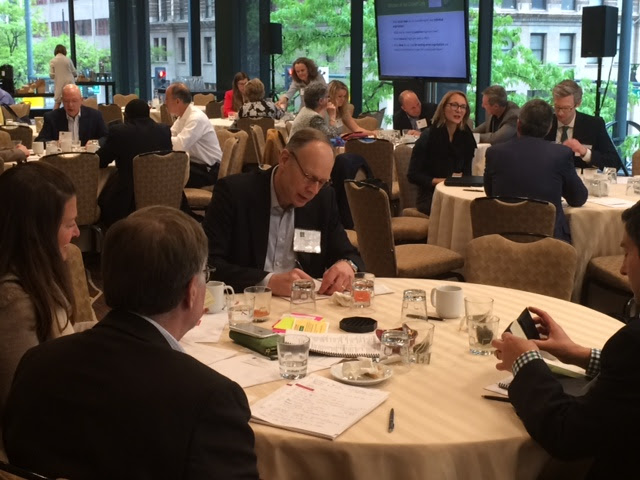|
Dear IEN Network, Welcome to the second edition of your bi-monthly newsletter! This month Bob Litterman, Chairman of the Risk Committee and Academic Advisory Board at Kepos Capital, gives his perspective on selling stranded assets.
Updates from the NetworkDenver ForumOn May 7-8, IEN partnered with the Alliance for Sustainable Colorado to host the "divestment and sustainable investment forum". We explored fossil fuel divestment and emerging trends in sustainable investing with a diverse group of students, administrators, and other leaders form the higher education, healthcare, faith, municipal, and philanthropic sectors. Links to presentation slides and videos are availablehere. BASIC/WISE EventOn May 19th, Tony Cortese, Principle at IEN, moderated a panel at the BASIC/WISE event in Boston. The panel consisted of William Jarvis (Managing Director at Commonfund Institute), Christi Electris (Founding member of Croatan Institute), and Alice DonnaSelva (Investment Consultant at Prime Buchholz). For more information, please click here. Inaugural Steering Committee MeetingThe IEN has convened a new Steering Committee to provide strategic guidance and take a hands-on role in supporting the success of the Network. We held a very successful inaugural meeting on June 4, which gave the group a chance to get to know each other and being to prioritize areas of focus. We also began the process of forming smaller working groups to address specific topics such as shareholder advocacy, making the business case for ESG investing, peer-to-peer networking, and several others. For a complete list of all steering committee members, please click here. Ceres ConferenceIEN attended the 2015 Ceres conference and INCR meeting on May 12-14 in San Francisco. With themes of innovation, collaboration and acceleration, they discussed many solutions to taking on climate change, water scarcity, and other environmental threats. Geeta Aiyer, a member of the IEN steering committee, was the recipient of this year's Joan Bavaria Award. CDP ESG Integration WebinarOn Wednesday, June 17th, CDP and the Intentional Endowment Network collaborated on a webinar examining how CDP can support intentionally designed endowments by providing accurate and reliable ESG information. Panelists included representatives from the University of California, Harvard Management Corporation, and the New School. For more information, click here. Upcoming IEN Events
 Other Upcoming Events
Featured Resources:
School Spotlight: Yale UniversityYale’s endowment is a model in more ways then one. Yale has been leader in the ethical investment movement for almost 50 years. In 1969, several professors and graduate students conducted a seminar entitled “Yale’s investments”, jump starting the conversation on ethical investments in the United States. One of the lasting impacts of this seminar and resulting publications was the creation of the Yale Advisory Committee on Investor Responsibility. Additionally, in 2014, Chief Investment Officer, David Swenson, wrote a letter to Yale’s Investment Office outlining the critical role that investments must play in mitigating climate change. He urged Yale’s Investment Office to “discuss the financial risks of climate change and the financial implications of current and prospective government policies to reduce greenhouse gas emissions”. To learn more about the leadership role Yale has taken, please click here. Feature ArticleSelling Stranded Assets: Profit, Protection, and ProsperityCan you protect your endowment, make money, and support action to reduce carbon emissions at the same time? Sell stranded assets. Many institutional investors including endowments, foundations, pensions, and even sovereign wealth funds are considering or have already divested from coal and other fossil fuel companies. At the US based World Wildlife Fund, where I chair the investment committee, we addressed this issue a little over two years ago. We asked ourselves what would be the impact on our portfolio holdings if appropriate incentives to reduce greenhouse gas emissions were instituted globally. The answer was obvious – certain assets such as reserves of coal and expensive sources of oil would become less valuable and the valuations of companies holding those assets would fall. We decided to protect our portfolio against the risk created by these “stranded assets.” It was a decision based on managing portfolio risk in the face of our understanding of the reality of the externality created by burning fossil fuels, the likelihood that stranded assets would underperform, and the desire to position our portfolio to be aligned with our mission. In the news…A few select news articles we've posted over the past two months…
If you have an original piece you would like to submit for an upcoming newsletter, please email Peyton Siler Jones at[email protected]! For more information about the Intentional Endowments Network and how you can support this work, please contact Georges Dyer at [email protected]. |
|
Intentional Endowments Network · Boston, MA, United States |

